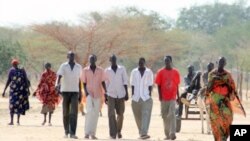JUBA, SOUTH SUDAN —
Mark Cutts, head of the UN Office for the Coordination of Humanitarian Affairs (OCHA) in Sudan, told VOA News in an email from Khartoum that the U.N. was making "every effort to meet the most urgent humanitarian needs of all those in the Abyei area.
"What is needed above all else is a political solution and the establishment of a joint Abyei area administration. Without this we will continue to face enormous difficulties in helping to meet the needs of all civilians in the Abyei area, and in helping those who have been displaced to return and start to rebuild their lives," he added.
Abyei has been the source of dispute between the Sudans for decades. Part of South Kordofan in Sudan until the end of the 22-year civil war, it was given "special administrative status" under the 2005 peace agreement that ended the conflict.
Its final status was supposed to be determined in a referendum in January 2011 -- at the same time as South Sudan voted for independence from Khartoum -- but the Abyei vote never happened.
In May 2011, Sudan invaded Abyei, and some 110,000 people fled the area. Most of them have since returned, and were living on food assistance provided by tribal chiefs and members of their communities.
The African Union has laid out groundrules for a proposed new referendum on the final status of Abyei. One of the suggested rules specifies that only Ngok Dinka people -- who have strong ties to the Dinka of South Sudan -- and others who reside permanently in Abyei would be eligible to vote.
Deng accused Sudan of planning to resettle Arab nomads in Abyei ahead of the proposed referendum and called on UN forces in the area to block the resettlement effort.
Abyei is the traditional homeland of the Ngok Dinka, but members of a northern nomadic Arab tribe cross the disputed area regularly to take their cattle to water sources and pastureland.
The South Sudanese co-chair of a committee set up to administer Abyei has accused United Nations agencies in the disputed border area of withholding humanitarian assistance from tens of thousands of returnees.
“What we have observed about the United Nations Systems is that there is lack of decision and lack of coordination," Luka Biong Deng, who co-chairs the Abyei Joint Oversight Committee (AJOC), told reporters in Juba after a trip to the Abyei area to see the conditions faced by returning residents.
"Resources are there... even the IOM has non-food items, but nobody is taking the decision to distribute these to the people," he said.
Mark Cutts, head of the UN Office for the Coordination of Humanitarian Affairs (OCHA) in Sudan, told VOA News in an email from Khartoum that the U.N. was making "every effort to meet the most urgent humanitarian needs of all those in the Abyei area.
"What is needed above all else is a political solution and the establishment of a joint Abyei area administration. Without this we will continue to face enormous difficulties in helping to meet the needs of all civilians in the Abyei area, and in helping those who have been displaced to return and start to rebuild their lives," he added.
Abyei has been the source of dispute between the Sudans for decades. Part of South Kordofan in Sudan until the end of the 22-year civil war, it was given "special administrative status" under the 2005 peace agreement that ended the conflict.
Its final status was supposed to be determined in a referendum in January 2011 -- at the same time as South Sudan voted for independence from Khartoum -- but the Abyei vote never happened.
In May 2011, Sudan invaded Abyei, and some 110,000 people fled the area. Most of them have since returned, and were living on food assistance provided by tribal chiefs and members of their communities.
The African Union has laid out groundrules for a proposed new referendum on the final status of Abyei. One of the suggested rules specifies that only Ngok Dinka people -- who have strong ties to the Dinka of South Sudan -- and others who reside permanently in Abyei would be eligible to vote.
Deng accused Sudan of planning to resettle Arab nomads in Abyei ahead of the proposed referendum and called on UN forces in the area to block the resettlement effort.
Abyei is the traditional homeland of the Ngok Dinka, but members of a northern nomadic Arab tribe cross the disputed area regularly to take their cattle to water sources and pastureland.





